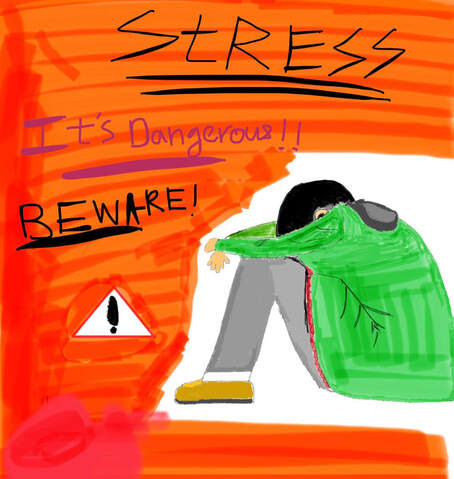
When Is One’s Sacrifice Most Valuable?
September 13, 2021
The Illusion of Time
April 6, 2022
Chronic Stress: A Killer
You are scrolling through your Facebook feed or Twitter timeline and randomly you come across a post regarding a new research warning how stress can be the key factor behind many serious diseases. This scenario doesn’t feel much unfamiliar, right? But have you ever wondered how something as abstract as stress can cause such life-threatening ailments. Well, let’s find it out!
The answer lies over the basis of the HPA axis, the hypothalamus-pituitary-adrenal axis.
Ughhh i know! If you are someone who is not from a medical background, your head must be spinning with confusion on reading such complex jargon but don’t worry we’ll start from the basics.
So in our brain, there is a small cone-shaped structure projecting downwards, that small but very vital structure is called the ‘hypothalamus’. The hypothalamus is like the control center of the body. It maintains the internal balance in the body and has vast effects on our hormonal system. That’s a lot of work, no?
That was a brief introduction to our hypothalamus. Now let’s move on to the second jargon: the ‘pituitary gland’. Well, we have already established that the hypothalamus projects downwards. I’ll complete the story of this downfall by adding that it projects downwards to connect with a structure called the pituitary gland. The pituitary gland is also called the master gland because it regulates all of the primary functions of the body. This master gland takes commandments from the boss. Who is the boss? Yep that’s right; the hypothalamus (boss is not a medical term!).

Coming to our third jargon; the ‘adrenal gland’. The adrenal gland is the small gland located over each kidney and it has a very important role in stress. When our body is stressed it releases a certain hormone called ‘cortisol’.
So now that we are familiar to the terminologies, let’s relate them to our daily lives and ponder what happens when we are in stress. As the conscious part of your brain sees a fear, it sends signals to the hypothalamus. Hypothalamus through the HPA axis causes adrenal glands to release cortisol, the stress hormone. One thing to note here is that even if the fear is not real, once your conscious brain sends a signal to the hypothalamus, the axis continues forward!

Cortisol has very interesting properties, its purpose is to manage the survival of the body in an emergency. How? Through following effects
- It shifts the blood supply from organs to the muscles
- It decreases the blood supply in your forebrain and shifts it to your hindbrain as the hindbrain elicits life-sustaining reflexes
- Suppresses the immune system as at that time the immediate survival is necessary, your body doesn’t want to invest energy fighting bacteria while being eaten by a furious lion!
All of these mechanisms are not bad, they in fact are very important for survival. The problem lies when this emergency switch is continuously turned on and that condition is known as “chronic stress”.
Chronic stress does to your body what sharp pieces of glass do to a tire; it ruins it from every side.
At first, it would decrease the levels of immunity in the body making it more susceptible to infections. It also causes brain fog and memory loss as the blood supply to the forebrain is compromised.
During prolonged periods of stress, our body receptors gain resistance to cortisol leading to glucocorticoid receptor resistance (GCR), this resistance increases the chance of chronic inflammatory diseases such as cardiovascular, diabetes, and cancer.
Please be very careful about which things you need to stress on. We are architects of our own experience. Your subjective experience carries more power than your objective situation. Managing your stress is not only the gateway to your mental health nourishment but also your physical well-being because it is all connected. Take care of your beautiful existence!

_ _ _ _ _ _ _
Omer Farooq
MBBS Class of 2023
